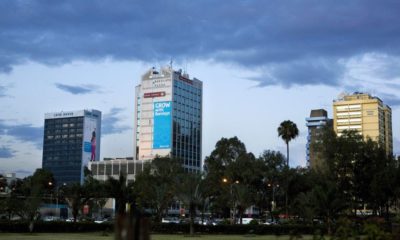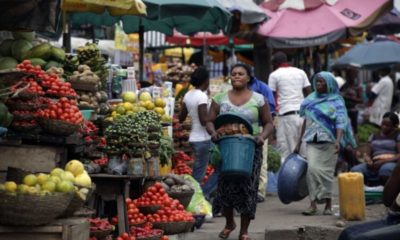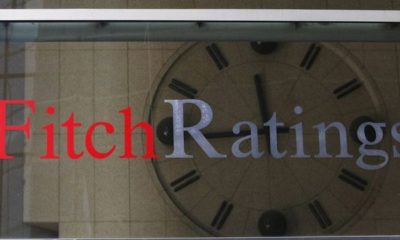Economy
Nigeria in Focus
Published
3 years agoon

The latest report from the National Bureau of Statistics (NBS) in its series on foreign trade in goods shows the total value of trade as N13.28trn in Q3 ‘21, representing an increase of 10% on the preceding quarter and a y/y increase of 59%. Compared with Q2 ‘21, the total export value rose by just 1% to N5.13trn, and the import value rose by 17% to N8.15trn.
The net result was a deficit of N3.02trn, which followed a deficit of N1.87trn the previous quarter. This makes eight consecutive trade deficits. The data were drawn primarily from the Nigeria Customs Service.
• Total trade in 2020 declined primarily due to lower exports. The implementation of lockdowns and restrictions had an adverse effect on export activity last year. The total trade value as a percentage of GDP stood at 21% in 2020. In Q3 ’21, total trade as a percentage of GDP stood at 8.7%.
• For Nigeria, the NBS notes that the majority of imports in Q3 ’21 originated from East Asia (China, especially). The value of imported agricultural goods. Manufactured products as well as oil-related products rose by 21% q/q, 14% q/q and 35% q/q respectively.
• Regarding export destination, India remained the top exporting partner for Nigeria in Q3 ‘21. The five top exports partners were India, (14.8%) Spain (12.2%), Italy (8.7%), France (7.1%), and the Netherlands (4.7%). These five
countries accounted for 47.5% of the total exports in Q3 ’21.
• As usual, crude oil accounted for the largest share (78%) of total exports in Q3. However, the value of crude oil exports declined by 1.3% q/q but rose by 66% y/y. The crude oil price (Bonny Light) averaged USD73.8/b in Q3.
• We note that raw cocoa beans, sesame seeds, cigarettes, natural rubber and aluminium featured as non-oil export products in Q3 ’21.
• Nigeria exported goods valued at N347bn to fellow members of the Economic Community of West African States (ECOWAS), compared with N363bn the previous quarter. This represented 52% of total exports within Africa.
Meanwhile, imports from ECOWAS accounted for 11% of the value of total imports.
• The leading port of operation during the quarter under review was the Apapa Port. Goods worth N4.7trn exited the country through this port. The next leading port of operation was Port Harcourt, through which goods worth N308bn were shipped to partner countries. Tin can Island was also very active and goods worth N104bn exited Nigeria through this port.
• The African Continental Free Trade Area (AfCFTA) agreement is expected to contribute significantly towards the development of regional value chains. To maximise the benefits of the agreement, Nigeria’s manufacturing sector needs to be strengthened. Furthermore, local manufacturers need to significantly improve their service delivery and product standards if they are to be competitive in a burgeoning intra-continental marketplace.
• The UN Economic Commission for Africa estimates that tariff reductions under the AfCFTA agreement will boost intra-African trade by over 51% by 2022 (or by as much as 100% if non-tariff barriers are reduced). The Federal Executive Council has ratified Nigeria’s membership of the AfCFTA.
Global/Regional in focus
The COVID-19 pandemic generated an unprecedented global shock, with a devastating effect on global trade largely due to the lockdown measures that were put in place across countries as a strategy to mitigate the pandemic’s spread. The impact on international trade was evident in the decline in commodity prices in the first quarter of 2020 (e.g. crude oil, copper, among others) as well as reduced manufacturing output and disrupted operations across global value chains. Based on data from the World Trade Organisation (WTO), the initial COVID-19 shock led to a -13.3% or USD569.9bn decline in global merchandise trade from USD4.3trn in Q1 ’20 to USD3.7trn in Q2 ’20.
However, due to increase in vaccination as well as reopening of economies, merchandise trade recovered to USD5.6trn in Q3 ’21 compared with USD4.9trn recorded in the corresponding period in 2020. This is also 16.4% above the average recorded over the past eight quarters (USD4.8trn).
Turning to the African landscape, the pandemic also adversely impacted the continent’s trade, particularly in 2020. For instance, in Q2 ’20 when the pandemic was at its peak, and the associated lockdown measures affected a large share of the global population, merchandise trade declined by 15.1% in Q2 ’20 to USD89.7bn compared with USD105.6bn recorded in the preceding quarter. However, there have been notable improvements in African trade in 2021 with global economies reopening and increase in vaccine uptake (African vaccination rate currently stands at 8.6%).
Intra-African trade is currently low as it accounts for less than 15% of total African exports, suggesting higher potential benefits from greater regional trade. However, when informal cross-border trade is taken into account, Africa records higher intraregional trade, particularly in agriculture. In some African countries, informal cross-border trade accounts for c.90% of official trade flow and contributes c.40% to total trade within regional economic communities.
The African Continental Free Trade Area (AfCFTA) agreement has the potential to alleviate the effects of COVID-19 in Africa and intra-African trade. The agreement has several benefits including the potential to boost economies and bolster trade diversity, encourage industrialisation, eliminate tariffs and non-tariff barriers as well as contribute to sustainable growth, among others.
At the last CIBN Banking and Finance conference held in September ‘21, a special session on AfCFTA was taken by Dr. Hippolyte Fofack, Chief Economist and Director of Research and International Cooperation Department at the African Export-Import Bank. He noted the numerous benefits of the AfCFTA agreement ranging from the deepening and acceleration of industrialisation to mutually reinforcing the relationship between regional integration and intra-African trade.
The question, therefore, is “what are the top sectors with high potential within AfCFTA markets?”. From our vantage point, top merchandise trade sectors include vehicles and transport equipment, agro-food products, energy, metals and machinery, as well as chemical products. As for the services sectors, we highlight; ICT, infrastructure and logistics, finance, banking and insurance, education as well as health.
The successful implementation of the AfCFTA to boost both extra- and intra-African trade hinges upon successfully tackling supply-side constraints, closing the trade financing gaps, excessive reliance on foreign currencies, among others. Industry sources suggest that Africa’s current untapped export potential amounts to USD21.9bn, equivalent to 43% of intra-African exports. The AfCFTA agreement can potentially add USD9.2bn worth of exports through partial tariff liberalisation over the next five years. Additionally, the agreement could boost employment and earning capacities among marginalised groups (i.e. women and youth).
You may like
-
Kenya to Become East Africa’s Top Economy as IMF Revises GDP Projections
-
Inflation Projected at 26.5% in 2025 as IMF Flags Weak Income Growth in Nigeria
-
Onne Port Records Historic Berthing with 301-Metre Kota Carum Container Ship
-
Inflation Jumps in March Ahead of Trade War Fallout and Planting Season
-
Fitch Upgrades Nigeria’s Rating to B, Flags Fiscal Risks Despite Reforms
-
Fitch Projects $5.2 Billion External Debt Repayment for Nigeria in 2025
















